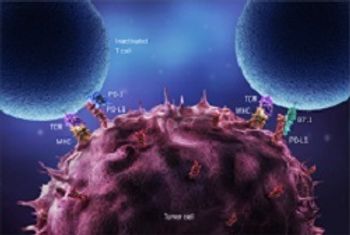
Oncology
Latest News
Latest Videos

More News

Scott Paulson, MD, co-director of the Gastrointestinal Research Program for The US Oncology Network, medical director for the Neuroendocrine Research and Treatment Center at Baylor Charles A. Sammons Cancer Center, Baylor University Medical Center, explains the current standard of treatment and novel approaches being taken in gastroenteropancreatic neuroendocrine tumors (GEP-NETs).



Nobel Prize winner James Allison, PhD, pioneering T-cell researcher, said the award represents the triumph of science and shows the value of research, even if it does not immediately lead to a scientific or commercial success.

UnitedHealthcare has announced it is listing 3 biosimilars as preferred drugs; Express Scripts has decided it will cover Eli Lilly’s and Amgen’s migraine drugs and will not cover Teva Pharmaceutical's drug; black men are more likely to get and die from prostate cancer compared with white men, but they are underrepresented in prostate cancer research because of a general distrust of the healthcare system.

A study has found no evidence that bleomycin plus granulocyte-stimulating factor (G-CSF) increases the risk for bleomycin-induced pulmonary toxicity in patients with Hodgkin lymphoma.

Last week, Bristol-Myers Squibb announced results from the phase 3 CheckMate -331 trial that investigated nivolumab (Opdivo) versus the current standard of care, chemotherapy, in the treatment of patients with small cell lung cancer (SCLC) who relapsed following platinum-based chemotherapy. The trial found that nivolumab did not significantly increase overall survival compared with chemotherapy.

Heloisa Soares, MD, assistant professor, University of New Mexico Cancer Center-Albuquerque, discusses the importance of treating neuroendocrine tumors with a multidisciplinary team, as well as the importance of engaging patients and their families in their care.

A recent survey investigates the role nurse practitioners can play to promote colorectal cancer screening.

Finding a place for value-based payment with the fast paced innovation in oncology.

Over the past decade, both recreational and medical marijuana use in the United States has grown tremendously. However, disputes surrounding the legal and ethical implications, safe administration, dispensing, health consequences, and therapeutic indications– albeit based on very limited clinical data– related to its usage abound.

NCODA presents findings from over 700 patient responses across the country to determine patient satisfaction over 4 categories: time, convenience, staff interaction, and overall satisfaction.

The National Comprehensive Cancer Network (NCCN) in collaboration with Avalere Health present survey results examining the experiences National Cancer Institute (NCI)-designated cancer centers have had with the marketplaces, the implications for patients' access to cancer care, and proposed policy solutions.

Multiple myeloma (MM) occurs 2 to 3 times more frequently in Americans of African descent than in Americans of European descent, and a new study has identified 3 gene types that account for this disparity.

Accountable care organizations (ACOs) have not had a significant impact on cancer care costs and utilization. While cancer care costs did decline from before the introduction of ACOs to after, there was no significant difference in spending decreases between ACO practices and non-ACO practices caring for patients with cancer.

Here are 5 breast cancer risk factors for Breast Cancer Awareness Month.

Practices in the US Oncology Network received an average positive payment adjustment under the Merit-based Incentive Payment System (MIPS) of 1.90% for performance in 2017, and 99% of the Network’s physicians were in the top tier of performers. The maximum allowable adjustment is 2.02%. The adjustment based on a clinician’s performance in 2017 impacts the clinician's Medicare reimbursement for 2019.

Major discoveries only happen when there is funding for fundamental science, said James Allison, PhD, chair of the Department of Immunology, the Vivian L. Smith Distinguished Chair in Immunology, director of the Parker Institute for Cancer Research, executive director of the Immunotherapy Platform at MD Anderson Cancer Center, and 2018 Nobel Prize cowinner in Medicine. He explained that he never would have discovered how to use the CTLA-4 protein to treat cancer if he hadn’t been trying to understand the mechanisms of T-cell activation.

Tisagenlecleucel's high price is aligned with the benefit the chimeric antigen receptor T-cell therapy provides over a patient's life. Approximately 40% of patients treated are expected to be long-term survivors.

This week, the National Comprehensive Cancer Network (NCCN) published new guidelines for patients centered around neuroendocrine tumors.

Last week, the FDA granted approval to immune checkpoint inhibitor cemiplimab-rwlc, to be sold as Libtayo, for the treatment of metastatic cutaneous squamous cell carcinoma (CSCC), or in patients with locally advanced CSCC who are not candidates for curative surgery or curative radiation.

A medical social network for physicians said it has compiled data that pinpoint the top 50 metropolitan areas where shortages of oncologists are expected to occur in the coming years. Doximity said the findings in its 2018 National Oncologists Workforce report are drawn from retirement trends, the percentage of state-trained specialists, and the prevalence of breast cancer.

The development of resistance to immunotherapy is poorly understood and is detrimental to patients who relapse on multiple lines of treatment. Transcriptional downregulation of class 1 human leukocyte antigen (HLA) may contribute to the developed resistance of immunotherapies, including checkpoint inhibitors, and warrants further investigation, according to a study published in Nature Communications.

During a session at the North American Neuroendocrine Tumor Society annual meeting, held October 4-6 in Seattle, Washington, Thorvardur Halfdanarson, MD, associate professor of medicine and consultant in medical oncology, Mayo Clinic, outlined the biggest news and updates in the treatment of neuroendocrine tumors (NETs).

During a session at the North American Neuroendocrine Tumor Society (NANETS) annual meeting, held October 4-6 in Seattle, Washington, Sukhmani Padda, MD, assistant professor of medicine, Stanford University Medical Center, gave an overview of updates made to lung neuroendocrine tumor guidelines.















